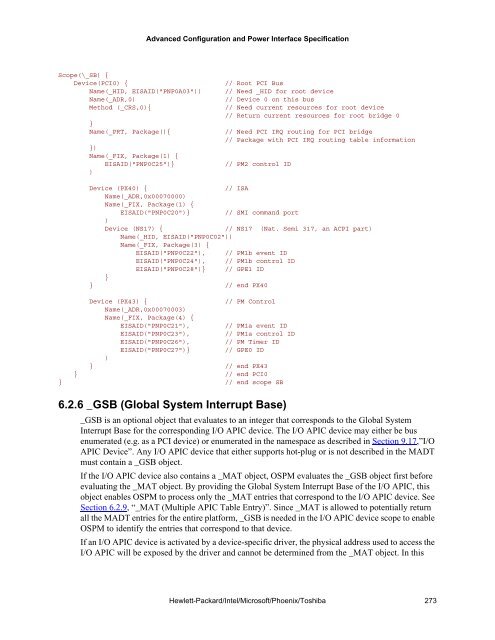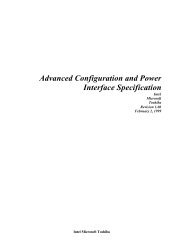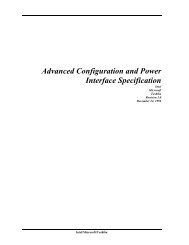- Page 1 and 2:
Advanced Configuration and Power In
- Page 3 and 4:
Revision History Revision Change De
- Page 5 and 6:
Revision Change Description Affecte
- Page 7 and 8:
Revision Change Description Affecte
- Page 9 and 10:
1 � 2 � 3 � Advanced Configur
- Page 11 and 12:
Advanced Configuration and Power In
- Page 13 and 14:
7 � Advanced Configuration and Po
- Page 15 and 16:
Advanced Configuration and Power In
- Page 17 and 18:
Advanced Configuration and Power In
- Page 19 and 20:
Advanced Configuration and Power In
- Page 21 and 22:
Advanced Configuration and Power In
- Page 23 and 24:
Advanced Configuration and Power In
- Page 25 and 26:
Advanced Configuration and Power In
- Page 27 and 28:
Advanced Configuration and Power In
- Page 29 and 30:
Advanced Configuration and Power In
- Page 31 and 32:
Advanced Configuration and Power In
- Page 33 and 34:
Advanced Configuration and Power In
- Page 35 and 36:
Advanced Configuration and Power In
- Page 37 and 38:
Advanced Configuration and Power In
- Page 39 and 40:
Advanced Configuration and Power In
- Page 41 and 42:
Device Driver Existing industry sta
- Page 43 and 44:
Advanced Configuration and Power In
- Page 45 and 46:
Advanced Configuration and Power In
- Page 47 and 48:
Advanced Configuration and Power In
- Page 49 and 50:
1.9.2 Programming Models Advanced C
- Page 51 and 52:
1.10 Related Documents Advanced Con
- Page 53 and 54:
Advanced Configuration and Power In
- Page 55 and 56:
Advanced Configuration and Power In
- Page 57 and 58:
I/O SAPIC Advanced Configuration an
- Page 59 and 60:
Advanced Configuration and Power In
- Page 61 and 62:
Advanced Configuration and Power In
- Page 63 and 64:
Advanced Configuration and Power In
- Page 65 and 66:
Advanced Configuration and Power In
- Page 67 and 68:
Advanced Configuration and Power In
- Page 69 and 70:
Advanced Configuration and Power In
- Page 71 and 72:
Advanced Configuration and Power In
- Page 73 and 74:
Advanced Configuration and Power In
- Page 75 and 76:
Advanced Configuration and Power In
- Page 77 and 78:
PWR1_EN PWR2_EN MDM_D3 MDM_D1 COM_D
- Page 79 and 80:
Advanced Configuration and Power In
- Page 81 and 82:
Advanced Configuration and Power In
- Page 83 and 84:
Advanced Configuration and Power In
- Page 85 and 86:
Advanced Configuration and Power In
- Page 87 and 88:
Advanced Configuration and Power In
- Page 89 and 90:
Advanced Configuration and Power In
- Page 91 and 92:
Advanced Configuration and Power In
- Page 93 and 94:
Advanced Configuration and Power In
- Page 95 and 96:
Advanced Configuration and Power In
- Page 97 and 98:
Advanced Configuration and Power In
- Page 99 and 100:
Legacy Legacy Boot (SCI_EN=0) Legac
- Page 101 and 102:
Advanced Configuration and Power In
- Page 103 and 104:
Advanced Configuration and Power In
- Page 105 and 106:
Advanced Configuration and Power In
- Page 107 and 108:
Advanced Configuration and Power In
- Page 109 and 110:
4.8.1.2 PM1 Control Registers Advan
- Page 111 and 112:
Advanced Configuration and Power In
- Page 113 and 114:
Advanced Configuration and Power In
- Page 115 and 116:
Advanced Configuration and Power In
- Page 117 and 118:
4.8.2.4 Real Time Clock Alarm Advan
- Page 119 and 120:
Advanced Configuration and Power In
- Page 121 and 122:
Advanced Configuration and Power In
- Page 123 and 124:
Advanced Configuration and Power In
- Page 125 and 126:
Advanced Configuration and Power In
- Page 127 and 128:
Advanced Configuration and Power In
- Page 129 and 130:
Advanced Configuration and Power In
- Page 131 and 132:
Advanced Configuration and Power In
- Page 133 and 134:
Advanced Configuration and Power In
- Page 135 and 136:
Advanced Configuration and Power In
- Page 137 and 138:
Advanced Configuration and Power In
- Page 139 and 140:
Advanced Configuration and Power In
- Page 141 and 142:
Advanced Configuration and Power In
- Page 143 and 144:
Field Byte Length Advanced Configur
- Page 145 and 146:
Advanced Configuration and Power In
- Page 147 and 148:
Advanced Configuration and Power In
- Page 149 and 150:
Advanced Configuration and Power In
- Page 151 and 152:
Field Byte Length Advanced Configur
- Page 153 and 154:
Field Byte Length Advanced Configur
- Page 155 and 156:
Field Byte Length Advanced Configur
- Page 157 and 158:
Field Byte Length Advanced Configur
- Page 159 and 160:
FACP - Flag Bit Length Advanced Con
- Page 161 and 162:
Advanced Configuration and Power In
- Page 163 and 164:
Advanced Configuration and Power In
- Page 165 and 166:
Field X Firmware Waking Vector Adva
- Page 167 and 168:
Advanced Configuration and Power In
- Page 169 and 170:
Advanced Configuration and Power In
- Page 171 and 172:
Advanced Configuration and Power In
- Page 173 and 174:
Advanced Configuration and Power In
- Page 175 and 176:
Advanced Configuration and Power In
- Page 177 and 178:
Advanced Configuration and Power In
- Page 179 and 180:
Advanced Configuration and Power In
- Page 181 and 182:
Advanced Configuration and Power In
- Page 183 and 184:
Field Byte Length Parking Protocol
- Page 185 and 186:
Advanced Configuration and Power In
- Page 187 and 188:
Advanced Configuration and Power In
- Page 189 and 190:
5.2.16.2 Memory Affinity Structure
- Page 191 and 192:
Advanced Configuration and Power In
- Page 193 and 194:
Advanced Configuration and Power In
- Page 195 and 196:
Advanced Configuration and Power In
- Page 197 and 198:
Advanced Configuration and Power In
- Page 199 and 200:
5.2.20.5.1 Sequence of Operations:
- Page 201 and 202:
Table 5-81 MPST Table Structure 5.2
- Page 203 and 204:
MEMORY_POWER _STATUS_REGIST ER Adva
- Page 205 and 206:
Advanced Configuration and Power In
- Page 207 and 208:
Table 5-87 Flag format Advanced Con
- Page 209 and 210:
Advanced Configuration and Power In
- Page 211 and 212:
Advanced Configuration and Power In
- Page 213 and 214:
Table 5-93 Socket Structure Advance
- Page 215 and 216:
Advanced Configuration and Power In
- Page 217 and 218:
Advanced Configuration and Power In
- Page 219 and 220:
Advanced Configuration and Power In
- Page 221 and 222:
Advanced Configuration and Power In
- Page 223 and 224:
Advanced Configuration and Power In
- Page 225 and 226:
Advanced Configuration and Power In
- Page 227 and 228:
Root R \_PR P \PID0 \_SB d CPU0 _ST
- Page 229 and 230:
Advanced Configuration and Power In
- Page 231 and 232:
Advanced Configuration and Power In
- Page 233 and 234:
Advanced Configuration and Power In
- Page 235 and 236:
Advanced Configuration and Power In
- Page 237 and 238:
Advanced Configuration and Power In
- Page 239 and 240:
Advanced Configuration and Power In
- Page 241 and 242:
Advanced Configuration and Power In
- Page 243 and 244:
Advanced Configuration and Power In
- Page 245 and 246:
Advanced Configuration and Power In
- Page 247 and 248:
Advanced Configuration and Power In
- Page 249 and 250:
Advanced Configuration and Power In
- Page 251 and 252:
Advanced Configuration and Power In
- Page 253 and 254:
Advanced Configuration and Power In
- Page 255 and 256:
Advanced Configuration and Power In
- Page 257 and 258: Advanced Configuration and Power In
- Page 259 and 260: Advanced Configuration and Power In
- Page 261 and 262: Advanced Configuration and Power In
- Page 263 and 264: Advanced Configuration and Power In
- Page 265 and 266: Advanced Configuration and Power In
- Page 267 and 268: Hex value Description Advanced Conf
- Page 269 and 270: Advanced Configuration and Power In
- Page 271 and 272: Advanced Configuration and Power In
- Page 273 and 274: Advanced Configuration and Power In
- Page 275 and 276: Advanced Configuration and Power In
- Page 277 and 278: Advanced Configuration and Power In
- Page 279 and 280: Advanced Configuration and Power In
- Page 281 and 282: Arguments: (1) Advanced Configurati
- Page 283 and 284: Advanced Configuration and Power In
- Page 285 and 286: 5.7.5 _DLM (DeviceLock Mutex) Advan
- Page 287 and 288: Return Value: None Advanced Configu
- Page 289 and 290: Advanced Configuration and Power In
- Page 291 and 292: 6.1.2 _CID (Compatible ID) Advanced
- Page 293 and 294: Advanced Configuration and Power In
- Page 295 and 296: Advanced Configuration and Power In
- Page 297 and 298: Advanced Configuration and Power In
- Page 299 and 300: Advanced Configuration and Power In
- Page 301 and 302: Advanced Configuration and Power In
- Page 303 and 304: Advanced Configuration and Power In
- Page 305 and 306: Advanced Configuration and Power In
- Page 307: Device(BUS0) { } Advanced Configura
- Page 311 and 312: Example: Advanced Configuration and
- Page 313 and 314: Advanced Configuration and Power In
- Page 315 and 316: Advanced Configuration and Power In
- Page 317 and 318: Advanced Configuration and Power In
- Page 319 and 320: Advanced Configuration and Power In
- Page 321 and 322: 6.2.10.1 Rules for Evaluating _OSC
- Page 323 and 324: Advanced Configuration and Power In
- Page 325 and 326: Advanced Configuration and Power In
- Page 327 and 328: Advanced Configuration and Power In
- Page 329 and 330: Advanced Configuration and Power In
- Page 331 and 332: Advanced Configuration and Power In
- Page 333 and 334: Advanced Configuration and Power In
- Page 335 and 336: Advanced Configuration and Power In
- Page 337 and 338: Scope(\_SB.PCI0) { Advanced Configu
- Page 339 and 340: Return Value: None Argument Informa
- Page 341 and 342: Status Code Description 0xA0-0xFFFF
- Page 343 and 344: Advanced Configuration and Power In
- Page 345 and 346: Arguments: None Return Value: Advan
- Page 347 and 348: Offset Field Name Advanced Configur
- Page 349 and 350: Advanced Configuration and Power In
- Page 351 and 352: 6.4.2.7 Fixed DMA Descriptor Advanc
- Page 353 and 354: Advanced Configuration and Power In
- Page 355 and 356: Advanced Configuration and Power In
- Page 357 and 358: Advanced Configuration and Power In
- Page 359 and 360:
Advanced Configuration and Power In
- Page 361 and 362:
Advanced Configuration and Power In
- Page 363 and 364:
Advanced Configuration and Power In
- Page 365 and 366:
Advanced Configuration and Power In
- Page 367 and 368:
Advanced Configuration and Power In
- Page 369 and 370:
Advanced Configuration and Power In
- Page 371 and 372:
Byte 3 Interrupt Vector Flags Advan
- Page 373 and 374:
Byte 11 Byte 12 Byte 13 Byte 14 Adv
- Page 375 and 376:
Advanced Configuration and Power In
- Page 377 and 378:
Advanced Configuration and Power In
- Page 379 and 380:
Advanced Configuration and Power In
- Page 381 and 382:
Advanced Configuration and Power In
- Page 383 and 384:
Advanced Configuration and Power In
- Page 385 and 386:
Advanced Configuration and Power In
- Page 387 and 388:
Arguments: None Return Value: Advan
- Page 389 and 390:
Advanced Configuration and Power In
- Page 391 and 392:
6.5.7 _GLK (Global Lock) Advanced C
- Page 393 and 394:
Advanced Configuration and Power In
- Page 395 and 396:
7.1.3 _ON Advanced Configuration an
- Page 397 and 398:
Object Description Advanced Configu
- Page 399 and 400:
Arguments: None Return Value: None
- Page 401 and 402:
Arguments: None Return Value: Advan
- Page 403 and 404:
Advanced Configuration and Power In
- Page 405 and 406:
7.2.17 _S2D (S2 Device State) Advan
- Page 407 and 408:
Advanced Configuration and Power In
- Page 409 and 410:
7.3.1 \_BFS (Back From Sleep) Advan
- Page 411 and 412:
Advanced Configuration and Power In
- Page 413 and 414:
Advanced Configuration and Power In
- Page 415 and 416:
Advanced Configuration and Power In
- Page 417 and 418:
Advanced Configuration and Power In
- Page 419 and 420:
Advanced Configuration and Power In
- Page 421 and 422:
Advanced Configuration and Power In
- Page 423 and 424:
Advanced Configuration and Power In
- Page 425 and 426:
Advanced Configuration and Power In
- Page 427 and 428:
Advanced Configuration and Power In
- Page 429 and 430:
8.4 Declaring Processors Advanced C
- Page 431 and 432:
} Advanced Configuration and Power
- Page 433 and 434:
Example Advanced Configuration and
- Page 435 and 436:
Advanced Configuration and Power In
- Page 437 and 438:
Advanced Configuration and Power In
- Page 439 and 440:
Advanced Configuration and Power In
- Page 441 and 442:
Advanced Configuration and Power In
- Page 443 and 444:
8.4.3.5 _TDL (T-state Depth Limit)
- Page 445 and 446:
Advanced Configuration and Power In
- Page 447 and 448:
Advanced Configuration and Power In
- Page 449 and 450:
Advanced Configuration and Power In
- Page 451 and 452:
Advanced Configuration and Power In
- Page 453 and 454:
Element Object Type Counter Wraparo
- Page 455 and 456:
8.4.5.1.1.3 Lowest Nonlinear Perfor
- Page 457 and 458:
8.4.5.1.2.1 Maximum Performance Reg
- Page 459 and 460:
Advanced Configuration and Power In
- Page 461 and 462:
Advanced Configuration and Power In
- Page 463 and 464:
} }) Advanced Configuration and Pow
- Page 465 and 466:
8.5.2 OSPM _OST Evaluation Advanced
- Page 467 and 468:
Advanced Configuration and Power In
- Page 469 and 470:
9.2.1 Overview Advanced Configurati
- Page 471 and 472:
Arguments: None Return Value: Advan
- Page 473 and 474:
Advanced Configuration and Power In
- Page 475 and 476:
Advanced Configuration and Power In
- Page 477 and 478:
Return Value: Advanced Configuratio
- Page 479 and 480:
Advanced Configuration and Power In
- Page 481 and 482:
Advanced Configuration and Power In
- Page 483 and 484:
Advanced Configuration and Power In
- Page 485 and 486:
Advanced Configuration and Power In
- Page 487 and 488:
Advanced Configuration and Power In
- Page 489 and 490:
Example: Advanced Configuration and
- Page 491 and 492:
Advanced Configuration and Power In
- Page 493 and 494:
} } } }) Advanced Configuration and
- Page 495 and 496:
Advanced Configuration and Power In
- Page 497 and 498:
9.12.4 Example: Memory Device Scope
- Page 499 and 500:
Advanced Configuration and Power In
- Page 501 and 502:
Advanced Configuration and Power In
- Page 503 and 504:
Advanced Configuration and Power In
- Page 505 and 506:
Example: Advanced Configuration and
- Page 507 and 508:
Advanced Configuration and Power In
- Page 509 and 510:
Advanced Configuration and Power In
- Page 511 and 512:
Advanced Configuration and Power In
- Page 513 and 514:
Advanced Configuration and Power In
- Page 515 and 516:
Arguments: (0) Return Value: Advanc
- Page 517 and 518:
Advanced Configuration and Power In
- Page 519 and 520:
Advanced Configuration and Power In
- Page 521 and 522:
Advanced Configuration and Power In
- Page 523 and 524:
Advanced Configuration and Power In
- Page 525 and 526:
Advanced Configuration and Power In
- Page 527 and 528:
Host Interface Advanced Configurati
- Page 529 and 530:
Advanced Configuration and Power In
- Page 531 and 532:
Advanced Configuration and Power In
- Page 533 and 534:
10.2.1 Battery Events Advanced Conf
- Page 535 and 536:
Advanced Configuration and Power In
- Page 537 and 538:
Advanced Configuration and Power In
- Page 539 and 540:
Advanced Configuration and Power In
- Page 541 and 542:
Advanced Configuration and Power In
- Page 543 and 544:
10.2.2.9 _BCT (Battery Charge Time)
- Page 545 and 546:
Advanced Configuration and Power In
- Page 547 and 548:
1 - On-line Advanced Configuration
- Page 549 and 550:
Object Description Advanced Configu
- Page 551 and 552:
Advanced Configuration and Power In
- Page 553 and 554:
Advanced Configuration and Power In
- Page 555 and 556:
Advanced Configuration and Power In
- Page 557 and 558:
Advanced Configuration and Power In
- Page 559 and 560:
Advanced Configuration and Power In
- Page 561 and 562:
11.1.5 Passive Cooling Advanced Con
- Page 563 and 564:
11.2 Cooling Preferences Advanced C
- Page 565 and 566:
Advanced Configuration and Power In
- Page 567 and 568:
Advanced Configuration and Power In
- Page 569 and 570:
Advanced Configuration and Power In
- Page 571 and 572:
Arguments: None Return Value: Advan
- Page 573 and 574:
Advanced Configuration and Power In
- Page 575 and 576:
Advanced Configuration and Power In
- Page 577 and 578:
Advanced Configuration and Power In
- Page 579 and 580:
Advanced Configuration and Power In
- Page 581 and 582:
Advanced Configuration and Power In
- Page 583 and 584:
Advanced Configuration and Power In
- Page 585 and 586:
Advanced Configuration and Power In
- Page 587 and 588:
} Advanced Configuration and Power
- Page 589 and 590:
Advanced Configuration and Power In
- Page 591 and 592:
External(\_SB.CPU1, DeviceObj) Adva
- Page 593 and 594:
Advanced Configuration and Power In
- Page 595 and 596:
Advanced Configuration and Power In
- Page 597 and 598:
Advanced Configuration and Power In
- Page 599 and 600:
Advanced Configuration and Power In
- Page 601 and 602:
Advanced Configuration and Power In
- Page 603 and 604:
Advanced Configuration and Power In
- Page 605 and 606:
Advanced Configuration and Power In
- Page 607 and 608:
Status Code All other error codes a
- Page 609 and 610:
Where: Advanced Configuration and P
- Page 611 and 612:
Data Returned: 12.9.2.3 Send Byte D
- Page 613 and 614:
Data Returned: 12.9.2.9 Write Block
- Page 615 and 616:
12.10 SMBus Devices Advanced Config
- Page 617 and 618:
Advanced Configuration and Power In
- Page 619 and 620:
Advanced Configuration and Power In
- Page 621 and 622:
Advanced Configuration and Power In
- Page 623 and 624:
13.1.3 SMBus Status Codes Advanced
- Page 625 and 626:
OperationRegion (� RegionName, //
- Page 627 and 628:
Advanced Configuration and Power In
- Page 629 and 630:
Advanced Configuration and Power In
- Page 631 and 632:
Advanced Configuration and Power In
- Page 633 and 634:
Advanced Configuration and Power In
- Page 635 and 636:
Advanced Configuration and Power In
- Page 637 and 638:
Advanced Configuration and Power In
- Page 639 and 640:
Advanced Configuration and Power In
- Page 641 and 642:
Advanced Configuration and Power In
- Page 643 and 644:
Advanced Configuration and Power In
- Page 645 and 646:
Advanced Configuration and Power In
- Page 647 and 648:
Advanced Configuration and Power In
- Page 649 and 650:
Advanced Configuration and Power In
- Page 651 and 652:
16.1 Sleeping States Advanced Confi
- Page 653 and 654:
Advanced Configuration and Power In
- Page 655 and 656:
Advanced Configuration and Power In
- Page 657 and 658:
Advanced Configuration and Power In
- Page 659 and 660:
Advanced Configuration and Power In
- Page 661 and 662:
Advanced Configuration and Power In
- Page 663 and 664:
Advanced Configuration and Power In
- Page 665 and 666:
Advanced Configuration and Power In
- Page 667 and 668:
Advanced Configuration and Power In
- Page 669 and 670:
Advanced Configuration and Power In
- Page 671 and 672:
Advanced Configuration and Power In
- Page 673 and 674:
Advanced Configuration and Power In
- Page 675 and 676:
Advanced Configuration and Power In
- Page 677 and 678:
Advanced Configuration and Power In
- Page 679 and 680:
Advanced Configuration and Power In
- Page 681 and 682:
Field Byte Length Max Sections Per
- Page 683 and 684:
Advanced Configuration and Power In
- Page 685 and 686:
Advanced Configuration and Power In
- Page 687 and 688:
Advanced Configuration and Power In
- Page 689 and 690:
18.5.1.1 Serialization Actions Adva
- Page 691 and 692:
Field Byte Length Advanced Configur
- Page 693 and 694:
Advanced Configuration and Power In
- Page 695 and 696:
Advanced Configuration and Power In
- Page 697 and 698:
Advanced Configuration and Power In
- Page 699 and 700:
Field Byte length Advanced Configur
- Page 701 and 702:
Advanced Configuration and Power In
- Page 703 and 704:
Advanced Configuration and Power In
- Page 705 and 706:
Advanced Configuration and Power In
- Page 707 and 708:
Advanced Configuration and Power In
- Page 709 and 710:
Advanced Configuration and Power In
- Page 711 and 712:
Advanced Configuration and Power In
- Page 713 and 714:
Advanced Configuration and Power In
- Page 715 and 716:
Result // Target� ) => Integer Ad
- Page 717 and 718:
) DebugTerm :=� Debug Advanced Co
- Page 719 and 720:
) Advanced Configuration and Power
- Page 721 and 722:
Result // Target� ) => Advanced
- Page 723 and 724:
) Advanced Configuration and Power
- Page 725 and 726:
Advanced Configuration and Power In
- Page 727 and 728:
Transfer8 | Transfer16 | Transfer8_
- Page 729 and 730:
) Advanced Configuration and Power
- Page 731 and 732:
Advanced Configuration and Power In
- Page 733 and 734:
) Advanced Configuration and Power
- Page 735 and 736:
) Advanced Configuration and Power
- Page 737 and 738:
Advanced Configuration and Power In
- Page 739 and 740:
19.2.4 ASL Macros Advanced Configur
- Page 741 and 742:
EISAID FromBCD ToBCD Advanced Confi
- Page 743 and 744:
Advanced Configuration and Power In
- Page 745 and 746:
Advanced Configuration and Power In
- Page 747 and 748:
To convert from an object of this D
- Page 749 and 750:
Advanced Configuration and Power In
- Page 751 and 752:
Advanced Configuration and Power In
- Page 753 and 754:
Advanced Configuration and Power In
- Page 755 and 756:
Advanced Configuration and Power In
- Page 757 and 758:
Break BreakPoint Case Continue Defa
- Page 759 and 760:
Advanced Configuration and Power In
- Page 761 and 762:
Advanced Configuration and Power In
- Page 763 and 764:
Advanced Configuration and Power In
- Page 765 and 766:
Advanced Configuration and Power In
- Page 767 and 768:
Advanced Configuration and Power In
- Page 769 and 770:
Arguments Advanced Configuration an
- Page 771 and 772:
Advanced Configuration and Power In
- Page 773 and 774:
Advanced Configuration and Power In
- Page 775 and 776:
Advanced Configuration and Power In
- Page 777 and 778:
Advanced Configuration and Power In
- Page 779 and 780:
Arguments Advanced Configuration an
- Page 781 and 782:
Advanced Configuration and Power In
- Page 783 and 784:
Advanced Configuration and Power In
- Page 785 and 786:
Arguments Advanced Configuration an
- Page 787 and 788:
Advanced Configuration and Power In
- Page 789 and 790:
Advanced Configuration and Power In
- Page 791 and 792:
Advanced Configuration and Power In
- Page 793 and 794:
Advanced Configuration and Power In
- Page 795 and 796:
Advanced Configuration and Power In
- Page 797 and 798:
Arguments Addend is evaluated as an
- Page 799 and 800:
Store (“ABCDEFGH”, Index (BUFF,
- Page 801 and 802:
Advanced Configuration and Power In
- Page 803 and 804:
Advanced Configuration and Power In
- Page 805 and 806:
Advanced Configuration and Power In
- Page 807 and 808:
Advanced Configuration and Power In
- Page 809 and 810:
Advanced Configuration and Power In
- Page 811 and 812:
Advanced Configuration and Power In
- Page 813 and 814:
Advanced Configuration and Power In
- Page 815 and 816:
Advanced Configuration and Power In
- Page 817 and 818:
Advanced Configuration and Power In
- Page 819 and 820:
Advanced Configuration and Power In
- Page 821 and 822:
Advanced Configuration and Power In
- Page 823 and 824:
Arguments Advanced Configuration an
- Page 825 and 826:
Advanced Configuration and Power In
- Page 827 and 828:
Advanced Configuration and Power In
- Page 829 and 830:
Advanced Configuration and Power In
- Page 831 and 832:
Advanced Configuration and Power In
- Page 833 and 834:
Advanced Configuration and Power In
- Page 835 and 836:
Advanced Configuration and Power In
- Page 837 and 838:
Name (CNT, 5) Store (CNT, Local0) A
- Page 839 and 840:
Advanced Configuration and Power In
- Page 841 and 842:
Advanced Configuration and Power In
- Page 843 and 844:
Note: (Compatibility Note) New for
- Page 845 and 846:
Advanced Configuration and Power In
- Page 847 and 848:
Advanced Configuration and Power In
- Page 849 and 850:
Advanced Configuration and Power In
- Page 851 and 852:
Advanced Configuration and Power In
- Page 853 and 854:
Advanced Configuration and Power In
- Page 855 and 856:
Advanced Configuration and Power In
- Page 857 and 858:
Advanced Configuration and Power In
- Page 859 and 860:
Advanced Configuration and Power In
- Page 861 and 862:
DefSleep := SleepOp MsecTime SleepO
- Page 863 and 864:
Advanced Configuration and Power In
- Page 865 and 866:
20.2.6.2 Local Objects Encoding Adv
- Page 867 and 868:
Encoding Value Advanced Configurati
- Page 869 and 870:
Encoding Value Advanced Configurati
- Page 871 and 872:
\ S0 S1 MEM MEM CPU SET GET SET GET
- Page 873 and 874:
Advanced Configuration and Power In
- Page 875 and 876:
Advanced Configuration and Power In
- Page 877 and 878:
Advanced Configuration and Power In
- Page 879 and 880:
21.2.3.4 Strings Advanced Configura
- Page 881 and 882:
Advanced Configuration and Power In
- Page 883 and 884:
Advanced Configuration and Power In
- Page 885 and 886:
Advanced Configuration and Power In
- Page 887 and 888:
Advanced Configuration and Power In
- Page 889 and 890:
Advanced Configuration and Power In
- Page 891 and 892:
A.4.1 Power State Definitions Advan
- Page 893 and 894:
A.5.1 Power State Definitions Advan
- Page 895 and 896:
Advanced Configuration and Power In
- Page 897 and 898:
Advanced Configuration and Power In
- Page 899 and 900:
Advanced Configuration and Power In
- Page 901 and 902:
Advanced Configuration and Power In
- Page 903 and 904:
Advanced Configuration and Power In
- Page 905 and 906:
State Status Definition Advanced Co
- Page 907 and 908:
Advanced Configuration and Power In
- Page 909 and 910:
Advanced Configuration and Power In
- Page 911 and 912:
Advanced Configuration and Power In
- Page 913 and 914:
Advanced Configuration and Power In
- Page 915 and 916:
Advanced Configuration and Power In
- Page 917 and 918:
Advanced Configuration and Power In
- Page 919 and 920:
Primary Desktop Secondary Desktop T
- Page 921 and 922:
Advanced Configuration and Power In
- Page 923 and 924:
Advanced Configuration and Power In
- Page 925 and 926:
Advanced Configuration and Power In
- Page 927 and 928:
Advanced Configuration and Power In
- Page 929 and 930:
Advanced Configuration and Power In
- Page 931 and 932:
Symbols _EJx 301 A AC adapter devic
- Page 933 and 934:
primary terms 678 reserved object n
- Page 935 and 936:
Case (Conditional Execution) 728 ca
- Page 937 and 938:
D1 Device State definition 27 trans
- Page 939 and 940:
EFI definition 19 GetMemoryMap inte
- Page 941 and 942:
definition 20 events 20 registers 2
- Page 943 and 944:
hung systems 75, 76 hysteresis 522
- Page 945 and 946:
LNotEqual (Logical Not Equal) 769 L
- Page 947 and 948:
Notification Temperature Threshold
- Page 949 and 950:
implementation requirements 10 pass
- Page 951 and 952:
performance states 43 performance v
- Page 953 and 954:
estoring system context 619 results
- Page 955 and 956:
commands, restricted 580 data buffe
- Page 957 and 958:
throttling 387, 400 THT_EN 90 Timer









